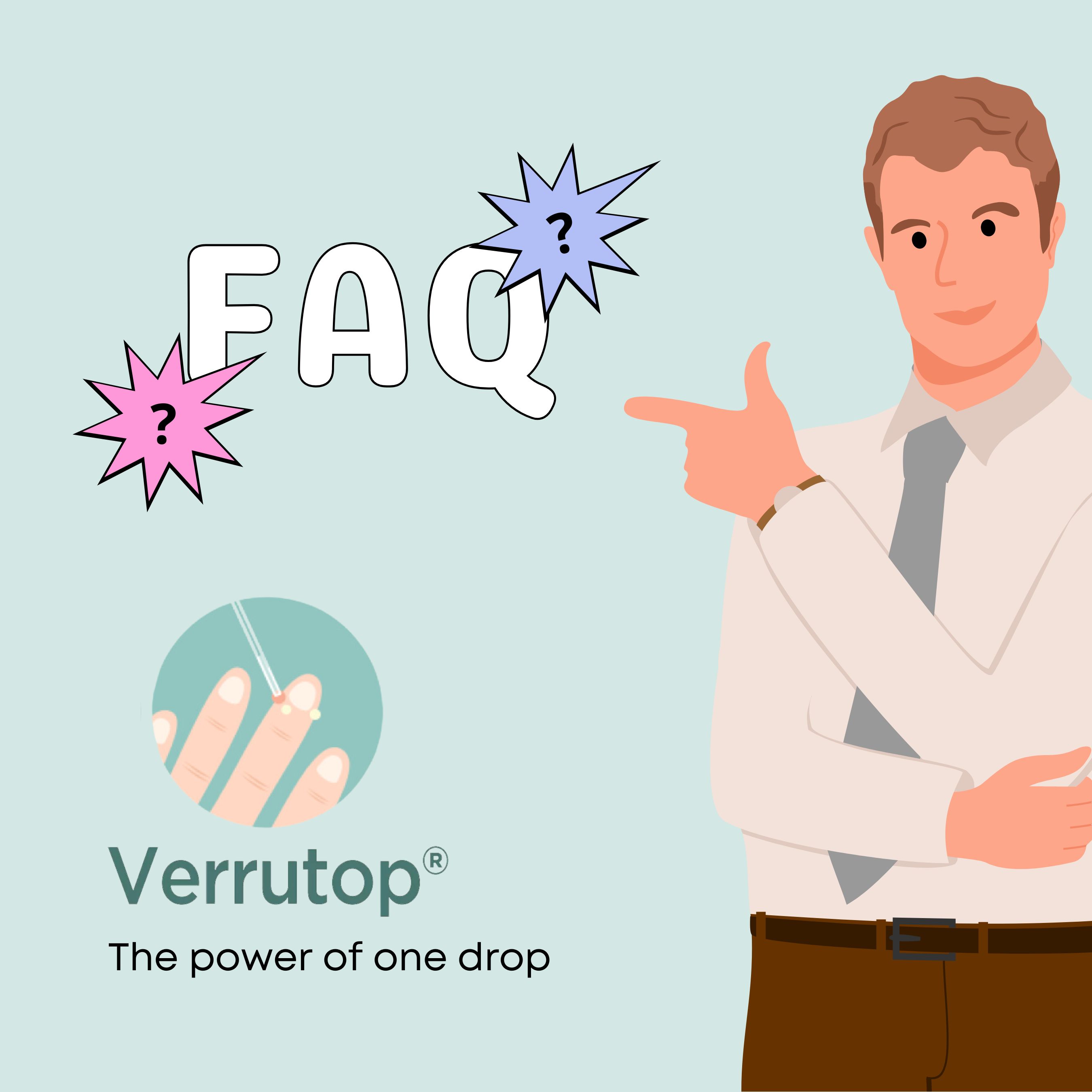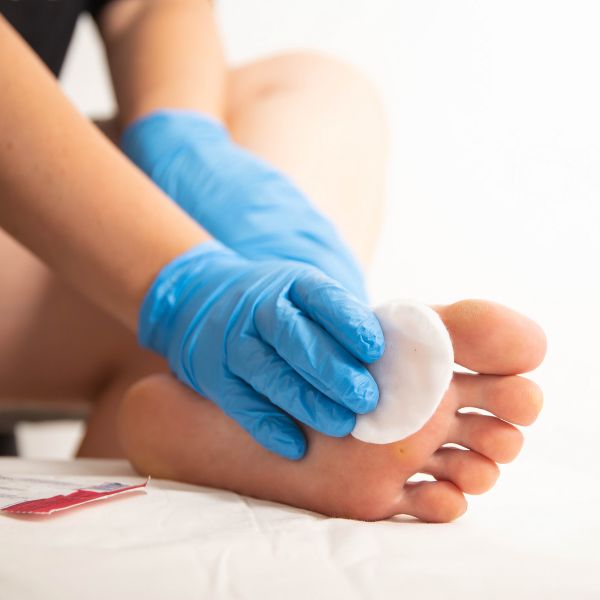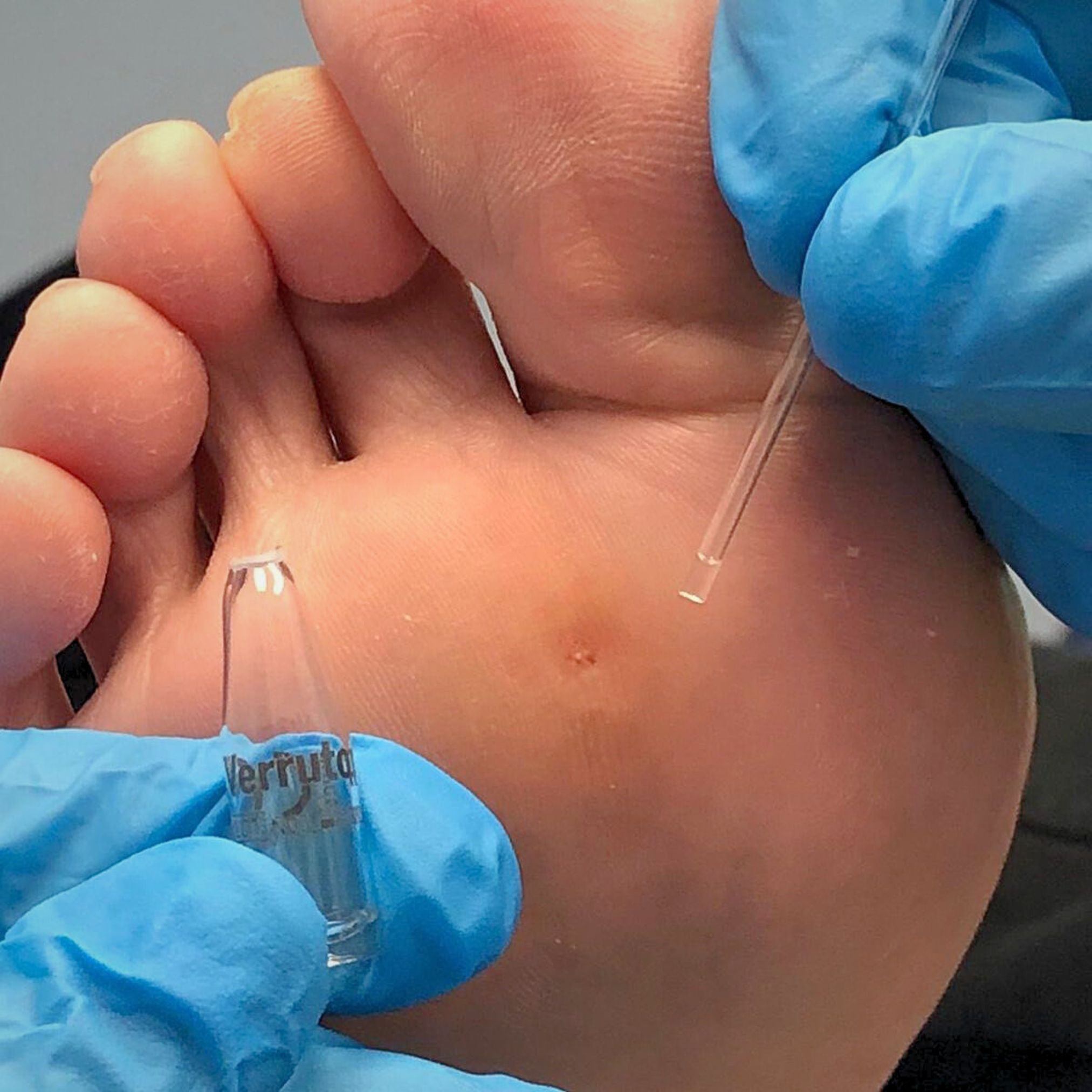We use cookies to make your experience better. To comply with the new e-Privacy directive, we need to ask for your consent to set the cookies. Learn more.
Verrutop - Frequently Asked Questions

1. My patient has been using another product before they have come to see me. How long should I leave it since their last use of this product before I start using Verrutop?
It is always advisable to allow some time for previous treatments to clear from the patient's system before starting a new therapy like Verrutop. This not only gives the skin a chance to recover but also helps attribute any adverse events to the specific product being used. Therefore, it is recommended to ensure that the patient has been treatment-free for at least 4 weeks before commencing Verrutop therapy.
2. I’ve read that it is nitric acid. There’s nothing new in this as I remember using nitric acid in the past. OR Isn’t Verrutop a caustic agent, just like salicylic acid?
Verrutop is not just nitric acid. It is a combination of organic and inorganic acids plus metal ions which act in a different way to nitric acid alone. This patented “nitri-zinc complex” creates a redox reaction on the wart, causing the production of nitrites which act to denature viral protein and mummify the wart tissue.
What is also different between Verrutop, and a purely caustic agent is that Verrutop treatment leaves behind a completely intact epithelium with no visible wound or area of damaged skin which can be prone to secondary infection.
3. How can I safely open a Verrutop ampoule?
To safely open a Verrutop ampoule, follow these steps:
- Wrap the Ampoule: Use a small piece of tissue or a soft cloth to wrap around the narrow neck of the ampoule. This will protect your fingers and reduce the risk of glass cuts.
- Break the Ampoule: Gently snap the ampoule at the scored ring around the neck. This is designed to break cleanly with minimal effort.
- Use an Ampoule Breaker (Optional): If you prefer extra safety, consider purchasing an ampoule breaker. These inexpensive tools can make the process even easier.
4. How do I know which warts to pare down and which to treat with no intervention?
This you will learn from experience. As a general rule of thumb, longstanding warts, and verrucae on the base of the feet often respond better to Verrutop following some surgical activity to remove some of the hard, impervious wart from the surface.
5. Is it possible to treat a wart or verruca more than once in a single sitting?
Again, experience will point the way after you have got used to using Verrutop. With some larger and long-standing warts and verrucae it is more practical to apply smaller amounts of Verrutop, wait a few minutes to let it dry and then reapply again precisely for one to two occasions.
6. How can I tell if the product is effective?
You’ll be able to see a change in the colour of the verruca. Some warts go a pale-yellow shade, and some turn brown.
7. Can I use Verrutop if surgical debridement has caused bleeding?
If surgical debridement has caused bleeding, it’s best to wait until any significant bleeding has stopped before applying Verrutop. While some treatments require aggressive techniques that induce bleeding, Verrutop does not. Gentle debridement is sufficient, and there's no need to cause bleeding.
For more control during the procedure, consider using our dermal curettes. These come in five different sizes, ranging from 2.0 to 7.0 mm in diameter, allowing you to select the right size based on the tissue thickness. Each curette is individually sealed in a peel-apart, see-through package and available in packs of 10 units.
Please refer to our blog for more in-depth information on why you should use a dermal curette for verruca removal.
8. Does Verrutop treatment hurt, either upon application or after treatment?
Reports of pain associated with the use of Verrutop are few and far apart. Clinical studies generally report no pain and anecdotal comments from podiatrists and patients report minimal irritation in the vast majority of cases. Obviously, people’s pain thresholds vary but Verrutop appears to be remarkably free of pain.
9. How many treatments are needed to achieve wart clearance?
This depends upon the age of the wart, it’s size and the age of the patient. Studies have shown that an average of 3 treatments is required to clear a wart, with some detaching after the first session whilst others remain reluctant to detach after 5 or 6 sessions. We do not recommend continuation of Verrutop treatment if a verruca has failed to detach after 6 treatments.
However, in some cases, a few additional treatments may be needed. As a professional, you are best placed to make this decision. If you notice no visible changes or improvements after 2-3 treatments, it’s unlikely that Verrutop will be effective. On the other hand, if progress is evident after 6 treatments but the wart hasn't completely cleared, you may decide to continue with an extra session or two based on your professional judgment.
10. How much time should I leave between Verrutop treatments?
We recommend leaving a 2-week gap between each Verrutop treatment. This gives the solution time to work on the wart or verruca before deciding if more treatments are needed.
11. How do I get the liquid into the capillary?
Once placed in the opened ampoule the Verrutop liquid is naturally and automatically drawn up into the capillary-by-capillary action. There is no need for any mechanical force.
12. How do I control the flow of the liquid from the capillary?
Usually, contact of the end of the capillary with the skin surface is sufficient to cause the Verrutop to be drawn out of the capillary. However, should the flow be too great, resulting in too much liquid leaving the tube you could place your index finger over the top of the capillary to reduce flow and dab the area as before.
13. Is dressing needed after treatment?
No dressings required following application and it does not interfere with your daily routine.
14. Can the patient bathe after treatment?
Washing and showering have no effect on the response to Verrutop. However, it is advisable to avoid long soaks in the bath as this will re-hydrate the treated area and counter the desiccating effects of the Verrutop.
15. How long does Verrutop take to dry?
Generally, the Verrutop dries within a few minutes. If it takes longer then it is possible that you have applied too much liquid. See usage instructions for more information.
16. What if the wart doesn’t change colour after treatment?
If you are treating an area for the first time and it doesn’t change colour within 4-5 minutes, it is possible to reapply the Verrutop at the same sitting. This should only be done at the first sitting.
17. What should the patient do between treatments?
It is best to advise the patient to avoid hot, long soaks in the bath. On a positive note, they can increase the desiccation process by dabbing the treated area with surgical spirit twice daily between clinic appointments.
18. How long should I wait to use Verrutop after a previous treatment with a different product?
This depends upon the “damage” to the skin caused by the previous treatment. it is recommended to ensure that the patient has been treatment-free for at least 4 weeks before commencing Verrutop therapy.
19. Do I need to mask the surrounding area?
There is usually no need to mask the surrounding area since capillary application is very precise. It may be advisable to mask the nail if a wart is being removed from close to the nail margin as Verrutop can stain a nail permanently until it grows out. However, unlike cryotherapy, Verrutop does not damage the developing nail in the nail bed.
20. Why should Verrutop not be used on more than 6 occasions?
A small number of warts may not respond to Verrutop, and clinical studies indicate that the maximum effect is usually seen within 6 treatments. Therefore, the recommended limit is set at 6 treatments, as further applications are unlikely to be effective and may not provide good value for money.
However, in some cases, a few additional treatments may be needed. As a professional, you are best placed to make this decision. If you notice no visible changes or improvements after 2-3 treatments, it’s unlikely that Verrutop will be effective. On the other hand, if progress is evident after 6 treatments but the wart hasn't completely cleared, you may decide to continue with an extra session or two based on your professional judgment.
21. Where should I store Verrutop?
Store Verrutop out of direct sunlight and out of the sight and reach of children. DO NOT refrigerate verrutop.
22. Can I use it in combination with another product such as cryotherapy?
No, Verrutop needs to be used as a standalone treatment.
23. What do I do if the capillary gets clogged?
Replace it with a spare. Each Verrutop box includes 2 extra capillaries for this rare situation.
24. Can I use the same capillary on 2 verrucae on the same foot?
Yes, providing that the capillary is still able to draw up the Verrutop from the ampoule.
25. There’s no liquid in the ampoule?
There is only 0.1ml of liquid in the ampoule and this can easily “hide” in the top of the ampoule if it has been inverted. Hold the ampoule vertically and give the top a gentle tap and the liquid will transfer to the bottom of the ampoule.
26. Why do Espère healthcare only sell Verrutop to Registered Professionals and not to the general public?
Verrutop is a specialised product, requiring specialist pre-treatment and accurate placement onto the affected areas. For these reasons the CE marking stipulates it only to be used under the supervision of a Health Professional and in the case of the UK, Espère healthcare have decided that Verrutop should only be made available to qualified professionals who can apply the product as it is intended.
27. I’ve seen it available on websites that the public can access. Why is it there?
This is an issue with foreign parapharmacy websites who list all their inventory as though they were cosmetic products. As such they are outside the control of both Espère Healthcare and the owner of the Brand. Occasionally the product appears on the Ebay or any ecommerce website from similar groups, but these are quickly taken down as their supply is prohibited by their need to be used under medical supervision. For more information, you can read our blog on Why Verrutop is Exclusively for Professional Use?
28. How many verrucae can 0.1ml treat from a single ampoule?
This is obviously dependent upon the size of each verruca bur as a general rule each ampoule can give a single treatment to between 3 and 4 verruca's. Whilst the contents of an ampoule can be used for up to 24 hours once opened, it is not advisable to treat more than one patient from the same one.
29. Can I use a single ampoule on multiple patients?
This is not advisable for infection control reasons. You should consider each ampoule to be a single treatment unit for a single patient.
30. Can I use a pack on multiple patients?
Yes, providing that only a single patient is treated from each ampoule. A 4-ampoule pack of verrutop could be used to provide a single treatment procedure on 4 different patients.


31. What is the fastest way to treat a wart?
There is no such thing as a fast or slow way to treat a wart, but we'd recommend visiting a local podiatrist and asking for Verrutop treatment. It's painless and more effective than cryotherapy in reducing viral DNA in warts (HPV1/HPV2 60% vs. 0%).
32. Will warts go away on their own?
If you don’t treat a verruca, it can get bigger and more painful. It might grow over a centimetre wide and become covered in hard skin. While it might eventually go away on its own, this can take months or even years. In the meantime, it can spread and get worse, especially from pressure when walking or standing.
33. How do you know if it's a wart or not?
Corns hurt the most when you press directly on them with your finger. Warts, however, are more painful when you press them from the sides or squeeze them. You can also read our blog on Understanding the differences between corn or verruca?
34. Are verruca’s contagious?
Yes, verruca’s are caused by the human papillomavirus (HPV) and can spread through direct contact or by sharing surfaces like floors or towels.
35. Can verruca’s be prevented?
You can help prevent verrucas by avoiding direct contact with the virus. This includes wearing flip-flops in communal showers, not sharing towels or shoes, and keeping feet clean and dry.
36. Can verrucas come back after treatment?
Yes, verrucas can come back if the virus stays in the skin or if you are re-exposed to the virus. Proper treatment and preventative measures can help reduce the chance of them coming back.
37. When is a wart no longer contagious?
Once you have the HPV strain that causes warts, the virus can stay in your body for life. Even after treating and removing warts, they may come back later. However, after the warts are removed, you typically have a period of clear skin where you are not contagious.
38. How do you get rid of a wart in 24 hours?
It's not possible to get rid of a wart in just 24 hours. Most treatments take at least 2 weeks, and some warts take even longer to heal. Cutting or shaving off a wart can make it worse and cause injury. We recommend seeing a professional and asking for Verrutop treatment, which is painless and more effective.
Registered podiatrists and chiropodists are qualified to treat verrucas, as are some Foot Health Practitioners (FHPs). You can find these professionals in local directories, through Google, or in local magazines.
39. What causes warts and verrucas?
Warts are caused by specific strains of the human papilloma virus (HPV). There are many types of HPV, and each one causes different kinds of warts. HPV makes the skin produce too much keratin, a hard protein. This extra keratin creates the rough, hard surface of a wart.
40. How Does HPV virus spread?
This virus can spread from person to person through close contact or by touching objects that someone with a wart has touched, such as towels, bathmats, or shower floors.


41. Is Verrutop better than cryotherapy for painless verruca treatment?
Yes, Verrutop offers a more comfortable alternative to cryotherapy for verruca removal. Unlike cryotherapy, which freezes the affected area and can cause pain, Verrutop uses a unique Nitrizinc complex that targets the verruca without freezing or burning the skin. This non-invasive treatment is highly effective and virtually painless, making it an ideal choice for those looking to avoid the discomfort often associated with traditional wart removal methods.
42. How does Verrutop compare to salicylic acid for wart removal?
Unlike salicylic acid, which works by peeling away the wart tissue over time, Verrutop uses a Nitrizinc complex to dry out the wart from within. This method is typically faster and less likely to cause irritation or damage to the surrounding skin, making Verrutop a more comfortable and efficient option.
43. Can Verrutop be used on warts that are located on joints or bony areas?
Yes, Verrutop can be used on warts located on joints or bony areas. Its non-invasive application makes it suitable for use on these more sensitive locations, but care should be taken to apply the product precisely to avoid irritation.
44. Can I use Verrutop to remove skin tags?
Verrutop is made for treating warts and verrucas, not skin tags. Skin tags are harmless skin growths and require different treatment. For removing skin tags, it’s best to see a healthcare professional who can recommend the right treatment.
45. Very often when debriding, the verruca will bleed- can verrutop still be applied?
Yes, you can still use Verrutop if the verruca bleeds during debridement. Bleeding shows you have reached the right level for treatment. Simply stop the bleeding by pressing on it or lifting the limb, but don't use any special agents to stop the bleeding as they might interfere with Verrutop. Once the bleeding stops, you can continue applying Verrutop.
46. When using Verrutop can you mask the verruca area with tape rather than Vaseline?
There is usually no need to mask the surrounding area since capillary application is very precise. It may be advisable to mask the nail if a wart is being removed from close to the nail margin as Verrutop can stain a nail permanently until it grows out. However, unlike cryotherapy, Verrutop does not damage the developing nail in the nail bed. Also, we’d advise not to use Vaseline as a masking agent as it can liquify when exposed to the treatment and block the capillary.
47. Can verrutop ever be applied to people with diabetes? for example if they have good circulation?
Verrutop can be applied to people with diabetes, provided they have good circulation and no complications like neuropathy or severe peripheral vascular disease. As you are the professional here, you can use your judgement to determine if Verrutop is suitable for your diabetic patients.
48. Where can I store the Verrutop ampoule?
Once broken, place the ampoule upright in the circular indentation in the top left quadrant of the foam liner inside the Verrutop box. This keeps the ampoule stable and makes it easier to insert the capillary tubes during treatment.
49. Is Verrutop safe for use on children?
Yes, Verrutop is safe for use on children aged 6 years and above. However, it should not be used on children under the age of 6 years.
50. Is Verrutop effective for removing warts on other parts of the body, like the back or chest?
Verrutop is effective for treating many types of warts caused by the Human papilloma virus (HPV), including those on the hands, feet, and genitals. However, it’s important to have any warts properly identified by a healthcare professional before treatment. Some skin conditions can look like warts but aren’t caused by HPV, so it's best to seek medical advice to ensure Verrutop is the right treatment for you. We do not recommend using Verrutop for home treatment without medical guidance.


51. Can I use Verrutop on my face or near my eyes?
No, Verrutop should not be used on the face or near the eyes. The product is not suitable for these sensitive areas and could cause irritation or damage.
52. Is it safe to use Verrutop on mucous membranes?
No, Verrutop should not be used on mucous membranes. Avoid applying the product to areas such as the inside of the mouth, nose, or other mucous membranes to prevent irritation or harm.
53. Can I order Verrutop through the NHS Supply Chain?
Yes, Verrutop is listed under the NHS Supply Chain Sexual Health Framework. You can order it using the NPC code FPH053.
54. How does Verrutop work to remove warts?
Verrutop removes warts by desiccating and denaturing the protein in the wart tissue. Unlike some treatments, it does not stimulate an immune response and has no effect on the rest of the body.
55. Can I go swimming after Verrutop treatment?
Yes, you can go swimming after Verrutop treatment, but it’s recommended to wait at least 48 hours after application. Also there's no need to cover the area with a waterproof plaster. However, avoid long soaks in the bath, as this can rehydrate the treated area and counteract the desiccating effects of Verrutop. To enhance the treatment, you can dab the area with surgical spirit twice daily between clinic appointments.
56. What documentation or patient consent is needed for Verrutop?
You can request the Verrutop patient consent form by emailing us at info@esperehealth.co.uk or by using the contact us form. We'll send it to you promptly.
57. Is there an expiration date on Verrutop ampoules?
Yes, each Verrutop ampoule has an expiration date and lot number printed on it.
58. What should I do if I miss an application of Verrutop?
If you miss an application, resume the treatment as soon as possible and adjust the schedule to maintain the recommended interval between sessions. Consult your Foot health professional or podiatrist for specific advice.
59. Can Verrutop be used on dogs?
There is limited information available about using Verrutop on animals. A journal article from Sweden explored its use in treating canine nodular sebaceous hyperplasia, and one veterinary practice did purchase it for this purpose. However, our experience is solely with human treatments, and the manufacturer has no veterinary data or contacts. Click here to read the full article.
60. Can I test Verrutop on my hand?
No, you should not test Verrutop on your hand or any other sensitive skin. If you're unsure whether the liquid is coming out of the capillary tube, test it on a non-living surface like a piece of paper instead. Applying it to delicate areas can cause irritation or skin damage.
61. Can I ask my patient to buy Verrutop?
No, Verrutop is a professional-use-only product and must be applied under professional supervision. Always purchase Verrutop yourself from a reputable source to ensure it's stored and shipped correctly, and to cover your insurance. You can buy it directly from our website at Verrutop.co.uk, or contact us for a full list of trusted suppliers.
62. What should I do if I accidentally put Verrutop on normal skin?
Rinse well with cold water.
63. Are plantar warts common in children, and can Verrutop be used safely to treat them?
Yes, plantar warts are quite common in children, especially those active in sports or who walk barefoot in public areas. These warts, caused by the human papillomavirus (HPV), are generally harmless but can be uncomfortable and spread easily. Verrutop is a safe, painless option for treating plantar warts in children, as it works by denaturing viral proteins without causing the discomfort often associated with treatments like freezing. However, it should not be used on children under the age of 6.
64. What are the tiny black dots on a wart?
Tiny black dots on a wart are usually dried blood trapped in small capillaries (tiny blood vessels) within the wart.
65. Can a patient go swimming after Verrutop treatment, and when should surgical spirit be applied?
Patients can go swimming, but we recommend waiting at least 48 hours after Verrutop application to ensure the treatment is effective. To support the desiccating effects of Verrutop, surgical spirit should be applied twice daily. Swimming rehydrates the treated area, so it's essential to apply surgical spirit afterward. Here's how to adjust the timing:
If swimming in the morning: Apply surgical spirit later in the day, ideally in the afternoon and evening.
If swimming later in the day: Apply it once in the morning and again after swimming.
The most important step is to always apply surgical spirit after swimming to maintain the treatment's effectiveness.
66. Can non-podiatrists like Foot Health Practitioners (FHPs) use Verrutop, and why?
Verrutop is not a “licensed” product but rather a Class IIa Medical Device. As such, it could technically be sold directly to the public. However, we made an ethical decision at launch to restrict Verrutop sales to trained professionals to ensure its correct and safe use.
Podiatrists:
For podiatrists, we require and verify their HCPC registration to authorise purchases.
Foot Health Practitioners (FHPs):
While FHPs are not registered in the same way as podiatrists, they are trained to manage verrucae and perform debridement techniques. For FHPs, we require evidence of their training and insurance cover to approve sales. Additionally, we offer marketing support and free training to any professional who may feel unsure about using Verrutop effectively. It’s important to note that while FHPs undergo generalised training, it includes the management of verrucae using various products, and Verrutop fits into this scope. Over the last five years, both podiatrists and FHPs have achieved consistent results with Verrutop in their practice.


About the Author

Categories




















